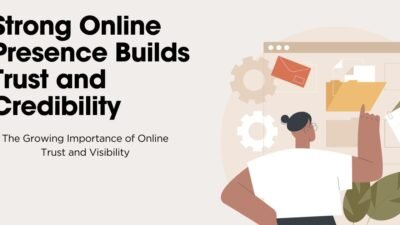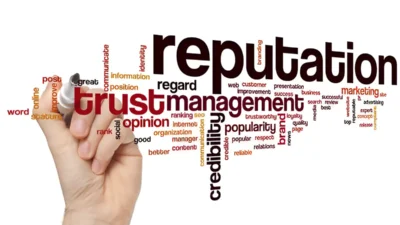Your reputation is one of your most valuable assets, whether you’re an individual, a business, or an organization. A positive online reputation can open doors to new opportunities, while a negative digital presence can shut them quicker than you might expect.
This is where online reputation management (ORM) steps in. ORM is the practice of monitoring and influencing what people find when they search for you or your brand online. Think customer reviews, social media mentions, press coverage, and your presence in search engines. But who uses ORM, and why do they need it?
This blog will explore the key groups benefiting from online reputation management and why it’s critical in today’s digital-first world.
What Is Online Reputation Management
Online reputation management involves actively managing and shaping the way you or your brand is perceived online. Effective ORM includes monitoring online reviews, responding to customer feedback, optimizing SEO for positive content, and mitigating potential crises that could harm your reputation.
But ORM isn’t just about damage control. It’s a proactive strategy essential for protecting and promoting your credibility, trustworthiness, and influence.
How Individuals Use Online Reputation Management
Professionals
First impressions happen online. Whether someone is applying for a job, entering a partnership, or pitching clients, the first step others often take is to Google their name. Professionals use ORM to ensure that their search results portray them in the best light possible.
For instance, LinkedIn profiles, personal websites, and professionally aligned social media pages often rank high in Google searches. ORM tools and strategies help individuals optimize these assets to highlight their expertise, credentials, and accomplishments.
Imagine you’re a marketing consultant, and a potential client searches for your name. A strong online reputation with glowing reviews and thought-leadership articles positions you as a trustworthy expert. Without ORM, however, that same search could unearth outdated information, negative comments, or simply an incomplete digital presence.
Public Figures
Celebrities, influencers, and politicians face unique challenges when it comes to managing their online reputations. With their every move under media scrutiny, one misstep can result in widespread backlash. ORM enables public figures to stay actively aware of media coverage, public sentiment, and social mentions, allowing them to address crises or misinformation swiftly.
For example, a celebrity might use ORM tools to monitor news outlets and trending social conversations. If misinformation spreads, ORM strategies make it easier to correct the narrative, minimizing potential public relations damage.
Why Businesses Need Online Reputation Management

Startups
For startups, a solid online reputation can mean the difference between gaining traction and going unnoticed. New businesses rely heavily on online reviews and recommendations to build credibility. ORM helps startups establish a strong presence by proactively generating positive content, encouraging customer feedback, and addressing complaints in a transparent way.
Imagine a tech startup launching its first app. Positive customer reviews about usability and reliability foster trust and encourage adoption. ORM ensures those reviews become prominent while addressing any complaints, showcasing the company’s commitment to excellence.
Small to Medium-Sized Businesses
For SMBs, where word-of-mouth and online reputation carry extra weight, ORM plays a pivotal role. Negative reviews or inaccurate information can deter potential customers, directly impacting revenue.
Take the example of a local bakery. A one-star review about poor service could deter hundreds of potential customers—but with ORM, the bakery can promptly respond, apologize, and invite the reviewer back for a better experience. Such quick actions not only show accountability but also win over prospective customers who value transparency.
Large Corporations
Corporations with vast digital footprints are more susceptible to public scrutiny. A single tweet, product recall, or viral controversy can snowball into a reputation crisis. ORM equips corporations with sophisticated tools to monitor mentions, track trending topics, and strategize timely responses.
Consider a major airline facing flight delays. ORM strategies allow the company to actively respond to frustrated passengers on social media in real-time, easing tensions and mitigating long-term damage.
How Brands Leverage Online Reputation Management
For brands, reputation goes beyond immediate sales; it’s about sustaining customer loyalty and building trust. A strong brand image encourages repeat customers, referrals, and even advocate communities that organically support the brand.
Luxury brands, for example, depend heavily on maintaining exclusivity and prestige. Negative commentary or associations with the brand can dilute this image. ORM ensures consistent messaging and helps control the narrative by pushing positive content about new launches, brand collaborations, or philanthropic efforts to the forefront.
Fashion labels like Gucci or sports brands like Nike often embed brand storytelling and culture into ORM, crafting narratives that resonate deeply with their audience while managing any criticism with poise.
Why Organizations Rely on Online Reputation Management
Non-Profits
For non-profit organizations, trust is everything. Donors, volunteers, and stakeholders want to ensure their resources are going to morally and ethically sound causes. ORM helps non-profits highlight their impact by amplifying success stories, testimonials, and transparent financial reports.
For example, if a non-profit receives criticism about misallocated funds, ORM strategies help present the organization’s full financial transparency, showcasing positive outcomes to restore trust.
Educational Institutions and Healthcare Providers
Schools, universities, and medical institutions are increasingly reliant on ORM to attract students, patients, and staff. From “top university rankings” to hospital reviews, prospective stakeholders rely on online opinions to make informed decisions.
A hospital, for instance, can use ORM to highlight patient success stories and its highly-rated care teams, all while quickly addressing any reviews about long waiting times or other concerns.
Key Takeaways
No matter the size or focus, online reputation management is essential for anyone or any entity with an online presence. Whether you’re an individual looking to build trust, a business hoping to capture market share, or an organization striving to maintain credibility, ORM offers invaluable benefits.
Effective ORM is about control, optimization, and strategy. It empowers individuals, businesses, brands, and organizations to actively shape how they are perceived, address potential issues, and capitalize on opportunities.
If you’re ready to take control of your online image, now’s the time to invest in ORM strategies that work. With the right tools, you can safeguard your reputation and leverage it for growth and success.
For more targeted outreach strategies, learn how account-based marketing works to target high-value clients.





